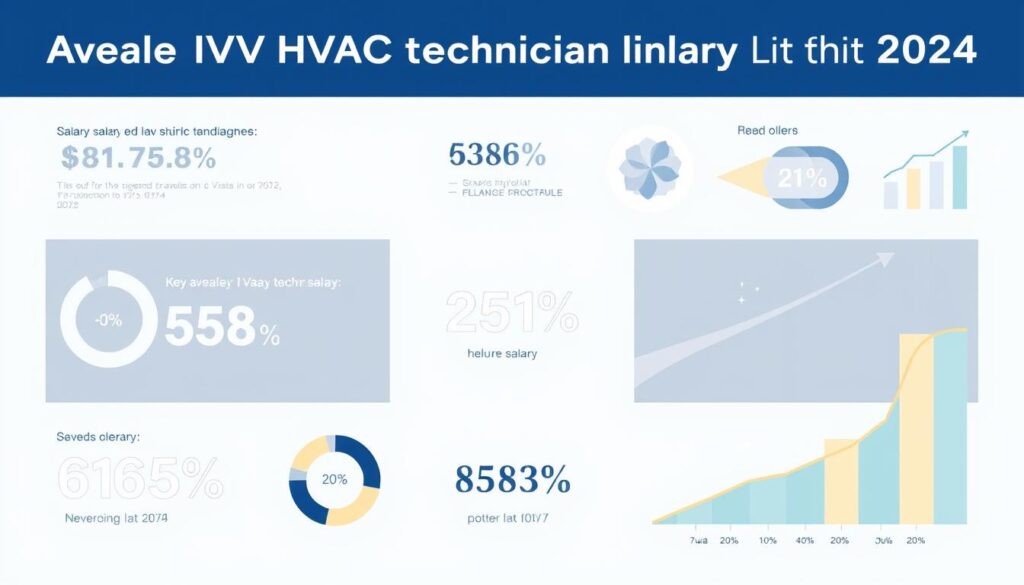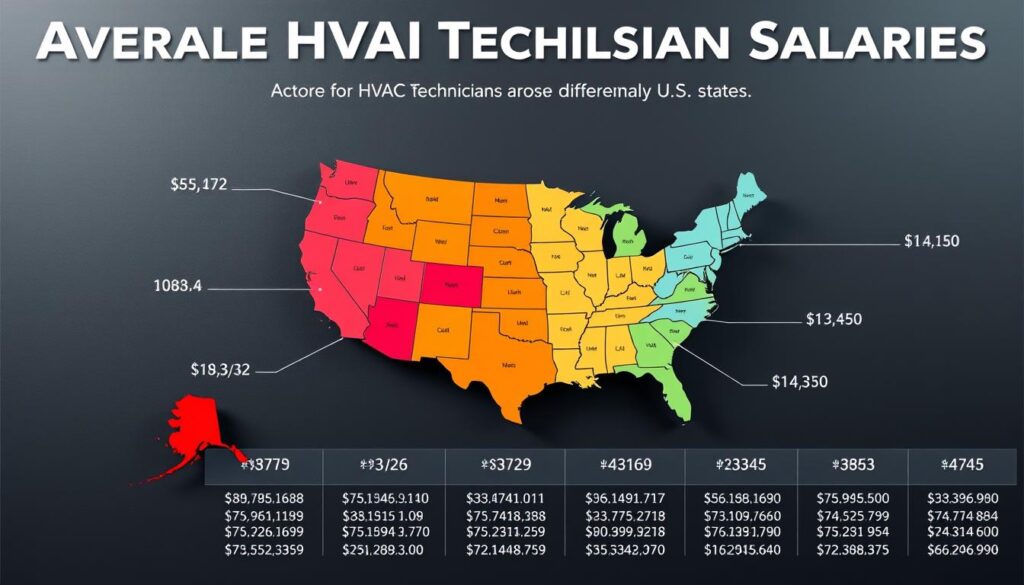Affiliate Disclosure
HVAC Guide Guys is a participant in the Amazon Services LLC Associates Program, an affiliate advertising program designed to provide a means for sites to earn advertising fees by advertising and linking to Amazon.
How Much Do You Make for HVAC? Ever thought about how much an HVAC technician makes? Skilled trades are getting more valuable, and knowing your salary is key. The HVAC world is full of chances for those who want to grow their career.

The Bureau of Labor Statistics says HVAC technician salaries are going up. In May 2022, the median salary was $51,390. Your pay can change based on your experience and what you specialize in.
This guide will cover everything about HVAC salaries. We’ll look at trends, how pay varies by location, and ways to increase your earnings. It’s all about making the most of your HVAC career.
Key Takeaways
- HVAC technician salaries have significant growth.
- Experience and specialization affect your pay.
- Where you work greatly influences your salary.
- Getting certified and learning more can raise your income.
- The HVAC field offers many chances to advance in your career.
Table of Contents
Overview of HVAC Industry Earnings in 2024
The HVAC industry is growing fast, opening up great job chances for those looking for stable and well-paying careers. With new tech and a focus on saving energy, hvac installer income is going up. This is drawing skilled technicians from all over.
There’s a big increase in HVAC jobs on the horizon. Experts say there will be a 13% jump in HVAC jobs by 2028. This is much faster than the average growth in other fields.
Current Market Demand for HVAC Technicians
Being an HVAC pro is more promising than ever. Several things are driving this demand:
- Heating and cooling systems are getting more complex.
- There’s a big push for energy-saving tech.
- Old buildings need regular upkeep.
- More homes and businesses are being built.
Key Factors Affecting HVAC Salaries
Several things affect how much hvac repairmen make, leading to different pay levels:
- Specialization in new tech systems.
- Where you live and the local market.
- Having professional certifications and extra training.
- How many years of experience you have.
Industry Growth Projections
The HVAC field is changing fast, thanks to new tech and green trends. Those who keep learning and get better at their job will have a lot of chances to grow.
“The future of HVAC is bright, with technology and energy efficiency creating new pathways for skilled technicians.” – Industry Expert
Average HVAC Technician Salary Breakdown
Knowing what you can earn as an HVAC technician is key to planning your career. The salary for HVAC technicians varies a lot, depending on several factors. This offers great chances for growth and financial security.
Your earnings as an HVAC pro depend on a few important things. More experienced technicians make a lot more than new ones. The average salary for HVAC contractors is about $54,282 a year. Salaries range from $37,410 to $71,420.
- Entry-level positions: $37,410 – $45,000
- Mid-career technicians: $45,000 – $60,000
- Experienced professionals: $60,000 – $71,420
Choosing a specialty can also affect your salary. Different HVAC areas can change how much you earn:
- Residential HVAC services
- Commercial system installations
- Industrial complex maintenance
- Refrigeration and specialized cooling systems
Pro tip: Getting advanced certifications and becoming an expert in specific areas can really boost your salary.
Your skills, experience, and eagerness to learn are the biggest factors in your income in the HVAC field.
Explore Our HVAC Shop
Looking for top-rated HVAC tools, parts, and accessories? Visit our shop and find the perfect solution for your needs.
Visit the ShopHow Much Do You Make for HVAC: Experience Level Analysis
Your hvac installer income changes a lot with experience. Knowing how salaries grow can help you plan your career and set financial goals.
Experience is key in figuring out how much you can earn in hvac work. Let’s look at salary ranges for different career stages.
Entry-Level Positions (0-2 years)
Starting out in HVAC, your pay will be lower. New technicians usually make between $30,000 and $42,000 a year. Your starting salary depends on:
- How much vocational training you’ve done
- What certifications you have
- Where you live
- What your first job pays
Intermediate Roles (2-4 years)
With more experience, your hvac installer income goes up. Intermediate technicians can earn between $45,000 and $55,000. You’ll get better at:
- Advanced technical skills
- Knowing specific HVAC systems
- Working more efficiently
Senior Positions (4-7 years)
With 4-7 years of experience, you can earn more. At this level, you can make $60,000 to $75,000 a year. Being senior means you get to:
- Lead teams
- Manage complex projects
- Get higher-paying client jobs
- Get bonuses for special skills
Keep in mind, these numbers are close estimates. They can change based on your skills, certifications, and where you work.
Explore Our HVAC Shop
Looking for top-rated HVAC tools, parts, and accessories? Visit our shop and find the perfect solution for your needs.
Visit the ShopTop-Paying States for HVAC Professionals

Thinking about becoming an HVAC technician? Where you live can really affect how much you earn. The pay for HVAC technicians varies a lot from state to state. Some places pay a lot more than others.
Some states pay HVAC technicians a lot more than others. This makes them great places for skilled workers to find good jobs. The top-paying states show how where you live can change how much you make.
- Alaska: Leads the pack with a 7.8% salary boost above the national average
- Oregon: Offers a competitive 7.61% increase in HVAC technician compensation
- Massachusetts: Provides a robust 7.40% premium on standard wages
What makes these states pay more? A few things:
- Extreme weather needs special HVAC skills
- Big cities have higher living costs
- Strong local economy helps pay more
- More people want advanced climate control
“Location can be a game-changer in your HVAC career trajectory” – Industry Expert
When planning your HVAC career, look into state-specific jobs. Some areas might have lower starting salaries but better growth chances. Choosing the right place can add thousands to your yearly income.
Pro tip: Think about the whole economic scene of a state, not just the salary, when deciding your career path.
Career Progression and Salary Growth
Your earnings in the HVAC field can grow as you move up in your career. Starting as an apprentice and becoming a master technician is a rewarding journey. It offers both personal and financial growth.
To understand your earning capacity in HVAC, focus on improving your skills and advancing professionally. Let’s look at the main career stages:
Path from Apprentice to Master Technician
Your HVAC career path is structured:
- Apprentice Level: Your starting point with basic training
- Journeyman Stage: You gain advanced technical skills and more duties
- Master Technician: You reach the highest level of expertise and leadership
“Success in HVAC is about continuous learning and skill refinement.” – HVAC Industry Expert
Certification Impact on Earnings
Certifications can greatly increase your earnings in HVAC. Important certifications include:
- EPA Section 608 Certification
- NATE (North American Technician Excellence) Certification
- State-specific licensing credentials
Leadership Role Compensation
As you move up, you’ll find leadership roles with better pay. Positions like senior technician, project manager, or technical supervisor come with higher salaries and more job satisfaction.
Investing in your professional growth can change your HVAC career path and earnings.
Urban vs Rural HVAC Salary Comparison

Your salary as an HVAC technician can change a lot based on where you work. Urban and rural places have different money situations for HVAC workers.
In big cities, HVAC techs usually make more money. This is because there’s a lot of demand and big commercial projects. Places like San Francisco, New York, and Chicago offer good pay for skilled people.
- Urban areas offer higher base salaries
- More complex commercial projects
- Greater competition for jobs
- Higher cost of living adjustments
Rural areas have their own benefits for HVAC techs. Even though starting salaries might be lower, these places often have:
- Less job competition
- Potential for becoming a community expert
- Lower operational costs
- Stronger customer loyalty
| Location Type | Average Salary | Job Opportunities |
|---|---|---|
| Urban Areas | $58,000 – $75,000 | High volume, diverse projects |
| Rural Areas | $45,000 – $65,000 | Steady, specialized work |
Your career strategy should consider both salary and long-term growth in your chosen location.
Benefits and Additional Compensation
HVAC pros get more than just a salary. Knowing about all the pay can help you earn more and make better career choices.
Your pay in HVAC includes more than just an hourly wage. Companies offer great benefits to keep the best workers.
Standard Benefits Package
Most HVAC firms give a strong benefits package. It helps your work and personal life:
- Comprehensive health insurance coverage
- Dental and vision plans
- 401(k) retirement savings with company matching
- Paid time off and vacation days
- Disability and life insurance
Performance Bonuses and Incentives
Performance pay can really boost your earnings:
| Bonus Type | Potential Earnings |
|---|---|
| Customer Satisfaction Bonus | $500 – $2,000 annually |
| Referral Incentives | $100 – $500 per referral |
| Productivity Rewards | 5-15% of base salary |
Overtime Opportunities
Working extra hours can increase your income. Seasonal peaks and emergency services offer great overtime chances. This can really add to your yearly earnings.
There’s more to earning than just a salary. By understanding and using these pay options, you can grow your finances in HVAC.
Explore Our HVAC Shop
Looking for top-rated HVAC tools, parts, and accessories? Visit our shop and find the perfect solution for your needs.
Visit the ShopCommercial vs Residential HVAC Earnings
Looking into hvac technician salaries, it’s key to know the difference between commercial and residential jobs. Commercial HVAC workers usually make more because their work is more complex.
Commercial HVAC techs deal with tough systems in big buildings. This means they can earn more. Their jobs include:
- Managing complex industrial cooling systems
- Servicing large-scale climate control infrastructure
- Working with advanced technological equipment
- Handling high-stakes mechanical installations
Residential HVAC techs work in homes and smaller places. They make less money but have steady work and regular hours. Their salaries are between $45,000 to $65,000 a year.
Commercial HVAC pros can earn up to $90,000 a year. Specialized skills in commercial systems can really increase your pay.
Being an expert in advanced systems can greatly raise your value in the HVAC field.
Choosing between commercial and residential HVAC depends on more than just money. Think about your interests, skills, and future goals too.
Factors Influencing HVAC Technician Pay
How much you make as an HVAC technician depends on many factors. It’s not just about basic skills. It’s about a mix of professional elements that can really affect your pay.
Education and training are key to your salary. Formal education is a good start. But, getting special certifications can really increase your earnings.
- Professional Certifications
- Educational Background
- Years of Experience
- Geographic Location
- Industry Specialization
Your work environment greatly affects your earnings. Different sectors pay differently:
| Sector | Average Annual Earnings | Potential Growth |
|---|---|---|
| Residential Services | $45,000 – $65,000 | Moderate |
| Commercial HVAC | $55,000 – $85,000 | High |
| Industrial Refrigeration | $65,000 – $95,000 | Very High |
Being specialized can really boost your salary. Investing in skills like green energy or complex refrigeration can lead to higher pay.
Where you work also matters. Cities with higher costs of living often pay more than rural areas.
“Continuous learning and skill development are the keys to maximizing your HVAC career.
Explore Our HVAC Shop
Looking for top-rated HVAC tools, parts, and accessories? Visit our shop and find the perfect solution for your needs.
Visit the ShopStrategies to Increase Your HVAC Income
To boost your hvac career earnings, plan smart and keep learning. The HVAC field has many ways to increase your income and grow your career.
Top HVAC pros know it’s not just about knowing how to fix things. They use smart strategies to make more money.
Specialization Options
Focus on specific areas to increase your worth. Look into:
- Green technology systems
- Industrial refrigeration
- Smart home climate control
- Energy-efficient installation
Additional Certifications
Getting more certifications can really up your game. Professional credentials show you’re an expert and can get you paid more.
- EPA refrigerant handling certification
- Advanced energy management credentials
- Commercial HVAC systems specialization
- Building performance institute certifications
Business Development Skills
Turn your technical skills into business chances. Learning business skills can lead to more money through:
- Client relationship management
- Marketing your specialized services
- Understanding business financial principles
- Creating service packages
Professional growth in HVAC is not just about technical skills, but strategic career development.
Conclusion
The HVAC industry is full of opportunities for those looking for a fulfilling career. Your earnings in HVAC depend on your experience, specialization, and ongoing skill improvement. Investing in your growth can significantly raise your salary.
Starting salaries range from $37,410 for beginners to over $90,000 for advanced roles. Boosting your earnings is possible by getting more certifications, honing specialized skills, and keeping up with new technologies.
To thrive in HVAC, you need to manage your career well. Seek out learning chances, connect with others in the field, and stay open to new tech. By always learning and improving, you can make your HVAC job both rewarding and long-lasting.
The HVAC industry’s need for skilled workers is on the rise. Your hard work and smart planning will help you earn more and find job satisfaction. The HVAC field’s future looks bright for those who are committed to learning and doing their best.

